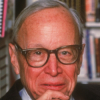Arthur M. Schlesinger, Jr.

Arthur M. Schlesinger, Jr.
Arthur Meier Schlesinger Jr.was an American historian, social critic, and public intellectual. The son of the influential historian Arthur M. Schlesinger Sr. and a specialist in American history, much of Schlesinger's work explored the history of 20th-century American liberalism. In particular, his work focused on leaders such as Harry S. Truman, Franklin D. Roosevelt, John F. Kennedy, and Robert F. Kennedy. In the 1952 and 1956 presidential campaigns, he was a primary speechwriter and adviser to the Democratic presidential nominee...
NationalityAmerican
ProfessionHistorian
Date of Birth15 October 1917
CountryUnited States of America
Arthur M. Schlesinger, Jr. quotes about
Science and Technology revolutionize our lives, but memory, tradition and myth frame our response. Expelled from individual consciousness by the rush of change, history finds its revenge by stamping the collective unconscious with habits, values, expectations, dreams. The dialectic between past and future will continue to form our lives.
History is, indeed, an argument without end.
What we need is a rebirth of satire, of dissent, of irreverence, of an uncompromising insistence that phoniness is phony and platitudes are platitudinous.
Clarity in language depends on clarity in thought.
If we are to survive, we must have ideas, vision, and courage. These things are rarely produced by committees. Everything that matters in our intellectual and moral life begins with an individual confronting his own mind and conscience in a room by himself.
Honest history is the weapon of freedom.
The basic human rights documents-the American Declaration of Independence and the French Declaration of the Rights of Man-were written by political, not by religious, leaders.
It is useful to remember that history is to the nation as memory is to the individual. As a person deprived of memory becomes disorientated and lost, not knowing where they have been or where they are going , so a nation denied a conception of the past will be disabled in dealing with its present and its future.
For most Americans the Constitution had become a hazy document, cited like the Bible on ceremonial occasions but forgotten in the daily transactions of life.
Politics in a democracy is, at the end, an educational process.
The military struggle may frankly be regarded for what it actually was, namely a war for independence, an armed attempt to imposethe views of the revolutionists upon the British government and large sections of the colonial population at whatever cost to freedom of opinion or the sanctity of life and property.
People who claw their way to the top are not likely to find very much wrong with the system that enabled them to rise.
History, in the end, becomes a form of irony.
Brave men earn the right to shape their own destiny.